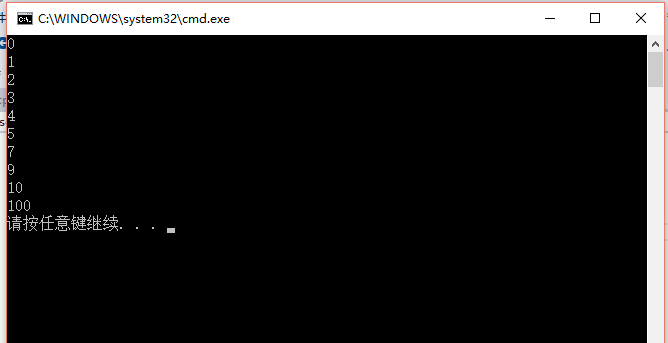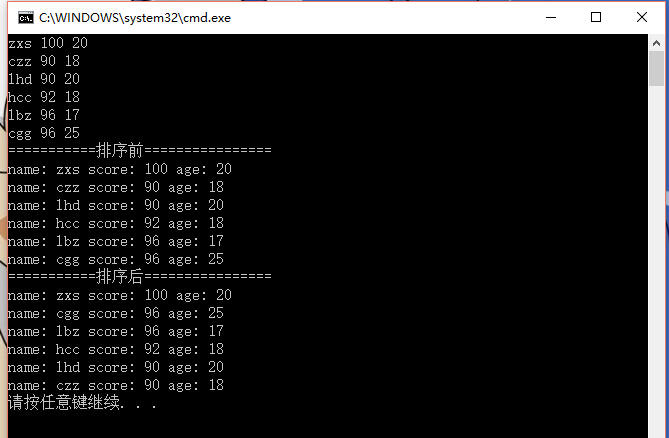关于C++中vector和set使用sort方法进行排序
C++中vector和set都是非常方便的容器,
sort方法是algorithm头文件里的一个标准函数,能进行高效的排序,默认是按元素从小到大排序
将sort方法用到vector和set中能实现多种符合自己需求的排序
首先sort方法可以对静态的数组进行排序
#include<iostream>
using namespace std;
int main(){
int a[] = { , , , , , , , , , };
sort(a, a +);
for (int i = ; i < ; i++)
cout << a[i] << endl;
return ;
}
运行结果:

这里可以看到是sort(a,a+10),但是数组a一共只有9个元素,为什么是a+10而不是a+9呢?
因为sort方法实际上最后一位地址对应的数是不取的,
而且vector,set,map这些容器的end()取出来的值实际上并不是最后一个值,而end的前一个才是最后一个值!
需要用prev(xxx.end()),才能取出容器中最后一个元素。
对vector使用sort函数:
第一种情形:基本类型,如vector<int>,vector<double>,vector<string>也是可以的
#include<iostream>
#include<vector>
#include<algorithm>
using namespace std;
int main(){
vector<int> a;
int n = ;
while (n--){
int score;
cin >> score;
a.push_back(score);
}
//cout <<" a.end()"<< *a.end() << endl; 执行这句话会报错!
cout << " prev(a.end)" << *prev(a.end()) << endl;
sort(a.begin(), a.end());
for (vector<int>::iterator it = a.begin(); it != a.end(); it++){
cout << *it << endl;
}
return ;
}
执行结果:

看到了吗,实际上end的前一个指针指向的元素才是插入时的最后一个值!
排序后从小大大。
第二种情形:用自定义的结构体进行sort算法,
这时候需要自己定义个比较函数,因为sort算法是基于容器中的元素是可以两两比较的,然后从小到大排序,所以要自定义怎么样才是小于('<')
#include<iostream>
#include<vector>
#include<set>
#include<string>
#include<algorithm>
using namespace std;
struct student{
char name[];
int score;
};
//自定义“小于”
bool comp(const student &a, const student &b){
return a.score < b.score;
}
int main(){
vector<student> vectorStudents;
int n = ;
while (n--){
student oneStudent;
string name;
int score;
cin >> name >> score;
strcpy(oneStudent.name, name.c_str());
oneStudent.score = score;
vectorStudents.push_back(oneStudent);
}
cout << "===========排序前================" << endl;
for (vector<student>::iterator it = vectorStudents.begin(); it != vectorStudents.end(); it++){
cout << "name: " << it->name << " score: " << it->score << endl;
}
sort(vectorStudents.begin(),vectorStudents.end(),comp);
cout << "===========排序后================" << endl;
for (vector<student>::iterator it = vectorStudents.begin(); it != vectorStudents.end(); it++){
cout << "name: " << it->name << " score: " << it->score << endl;
}
return ;
}
运行结果:

不过有时候一个排序条件不够,比如要求学生按分数从高到低排序,如果分数相同,则按照年龄从大到小排序
就需要在comp自定义函数里面修改一下判断了,原来是直接return a.score < b.score
现在就需要判断
if (a.score > b.score)
return true;
else if (a.score == b.score && a.age > b.age)
return true;
else
return false; 这里一定要记得else return false!!!有一次比赛的时候写到这个函数,有三个判断条件,结果忘了这茬,总是报错,
到后来有点着急了就自己手动实现了一下写了三个比较函数,调用了三次sort函数!!!!!
#include<iostream>
#include<vector>
#include<set>
#include<string>
#include<algorithm>
using namespace std;
struct student{
char name[];
int score;
int age;
};
//自定义“小于”
bool comp(const student &a, const student &b){
if (a.score > b.score)
return true;
else if (a.score == b.score && a.age > b.age)
return true;
else ///这里的else return false非常重要!!!!!
return false;
}
int main(){
vector<student> vectorStudents;
/*set<student> setStudents;*/
//int n = 5;
int n = ;
while (n--){
student oneStudent;
string name;
int score;
int age;
cin >> name >> score>>age;
strcpy(oneStudent.name, name.c_str());
oneStudent.score = score;
oneStudent.age = age;
vectorStudents.push_back(oneStudent);
}
cout << "===========排序前================" << endl;
for (vector<student>::iterator it = vectorStudents.begin(); it != vectorStudents.end(); it++){
cout << "name: " << it->name << " score: " << it->score << " age: "<<it->age<<endl;
}
sort(vectorStudents.begin(), vectorStudents.end(), comp);
//sort(setStudents.begin(), setStudents.end());
cout << "===========排序后================" << endl;
for (vector<student>::iterator it = vectorStudents.begin(); it != vectorStudents.end(); it++){
cout << "name: " << it->name << " score: " << it->score << " age: " << it->age << endl;
}
return ;
}
运行结果如下:

接下来,对于set做类似的操作。
set是一个集合,内部的元素不会重复,同时它会自动进行排序,也是从小到大
而且set的insert方法没有insert(a,cmp)这种重载,所以如果要把结构体插入set中,我们就要重载'<'运算符。
set方法在插入的时候也是从小到大的,那么我们重载一下<运算符让它从大到小排序
#include<iostream>
#include<vector>
#include<set>
#include<string>
#include<algorithm>
using namespace std;
struct student{
char name[];
int score;
};
//自定义“小于”
bool comp(const student &a, const student &b){
return a.score < b.score;
}
bool operator < (const student & stu1,const student &stu2){
return stu1.score > stu2.score;
}
int main(){
//vector<student> vectorStudents;
set<student> setStudents;
//int n = 5;
int n = ;
while (n--){
student oneStudent;
string name;
int score;
cin >> name >> score;
strcpy(oneStudent.name, name.c_str());
oneStudent.score = score;
setStudents.insert(oneStudent);
}
cout << "===========排序前================" << endl;
for (set<student>::iterator it = setStudents.begin(); it != setStudents.end(); it++){
cout << "name: " << it->name << " score: " << it->score << endl;
}
//sort(setStudents.begin(), setStudents.end(), comp);
//cout << "===========排序后================" << endl;
//for (set<student>::iterator it = setStudents.begin(); it != setStudents.end(); it++){
// cout << "name: " << it->name << " score: " << it->score << endl;
//}
return ;
}
运行结果:

我们可以看到,set内元素不会重复,而且它按照它所认为的“从小到大”进行了排序
关于C++中vector和set使用sort方法进行排序的更多相关文章
- 回调函数及数组中sort()方法实现排序的原理
1.回调函数:把一个方法A当一个参数值传递到另外一个函数B中,在B执行的过程当中我们随时根据需求让A方法执行: 什么是回调 :它是异步编程基本的方法,需要异步处理的时候一般采用后续传递的方式,将后 ...
- 定义一个数组,并对这个数组进行动态初始化,使用sort方法进行排序后,再将数组中的元素倒置过来。
Sort方法,生序排序 package com.fs.array; import java.util.Arrays; public class ArraySort { public static vo ...
- 论C++11 中vector的N种遍历方法
随着C++11标准的出现,C++标准添加了许多有用的特性,C++代码的写法也有比较多的变化. vector是经常要使用到的std组件,对于vector的遍历,本文罗列了若干种写法. (注:本文中代码为 ...
- C++11中vector的几种遍历方法
假设有这样的一个vector: vector<int> line={1,2,3,4,5,6,7,8,9}; 需要输出vector里的每个元素,主函数如下: void showvec(con ...
- Java中使用Collections.sort()方法对数字和字符串泛型的LIst进行排序
在List的排序中常用的是Collections.sort()方法,可以对String类型和Integer类型泛型的List集合进行排序. 首先演示sort()方法对Integer类型泛型的List排 ...
- .NET中string[]数组和List<string>泛型的相互转换以及Array类的Sort()方法(转)
从string[]转List<string>: " }; List<string> list = new List<string>(str); 从List ...
- 你真的会用JavaScript中的sort方法吗
在平时的业务开发中,数组(Array) 是我们经常用到的数据类型,那么对数组的排序也很常见,除去使用循环遍历数组的方法来排列数据,使用JS数组中原生的方法 sort 来排列(没错,比较崇尚JS原生 ...
- python中sort和sorted排序的相关方法
Python list内置sort()方法用来排序,也可以用python内置的全局sorted()方法来对可迭代的序列排序生成新的序列. 1)排序基础 简单的升序排序是非常容易的.只需要调用sorte ...
- Array类的Sort()方法
刚复习了Array类的sort()方法, 这里列举几个常用的,和大家一起分享. Array类实现了数组中元素的冒泡排序.Sort()方法要求数组中的元素实现IComparable接口.如System. ...
随机推荐
- 点击截图功能 js canvas
使用:html2canvas实现浏览器截图 <html> <head> <meta name="layout" content="main& ...
- 【bzoj1103】【POI2007】【大都市】(树状数组+差分)
在经济全球化浪潮的影响下,习惯于漫步在清晨的乡间小路的邮递员Blue Mary也开始骑着摩托车传递邮件了.不过,她经常回忆起以前在乡间漫步的情景.昔日,乡下有依次编号为1..n的n个小村庄,某些村庄之 ...
- 利用百度地图WEB服务APIGeoCoding API批量地址解析
Geocoding API包括地址解析和逆地址解析功能: 地理编码:即地址解析,由详细到街道的结构化地址得到百度经纬度信息,例如:“北京市海淀区中关村南大街27号”地址解析的结果是“lng:116.3 ...
- Python实战之列表简单练习
['__add__', '__class__', '__contains__', '__delattr__', '__delitem__', '__dir__', '__doc__', '__eq__ ...
- 使用spark对hive表中的多列数据判重
本文处理的场景如下,hive表中的数据,对其中的多列进行判重deduplicate. 1.先解决依赖,spark相关的所有包,pom.xml spark-hive是我们进行hive表spark处理的关 ...
- js系列教程1-数组操作全解
全栈工程师开发手册 (作者:栾鹏) 快捷链接: js系列教程1-数组操作全解 js系列教程2-对象和属性全解 js系列教程3-字符串和正则全解 js系列教程4-函数与参数全解 js系列教程5-容器和算 ...
- JS 函数作用域及变量提升那些事!
虽然看了多次js函数作用域及变量提升的理论知识,但小编也是一知半解~ 这几天做了几道js小题,对这部分进行了从新的理解,还是有所收获的~ 主要参考书籍: <你不知道的JavaScript(上卷) ...
- ViewPager使用记录1——展示固定数据
ViewPager是v4支持库中的一个控件,相信几乎所有接触Android开发的人都对它不陌生.之所以还要在这里翻旧账,是因为我在最近的项目中有多个需求用到了它,觉得自己对它的认识不够深刻.我计划从最 ...
- 简单说下C#变量的作用域
变量的作用域分为局部变量和全局变量举个小例子 class Program { int i = 3;//这个变量i 需要实例化Program才能使用 static void Main(string[] ...
- Node Inspector 代理实现
本文首发于 https://github.com/whxaxes/blog/issues/9 背景 平时做 node 开发的时候,通过 node inspector 来进行断点调试是一个很常用的 de ...
